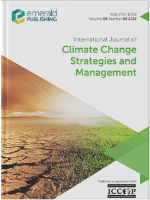
International Journal of Climate Change Strategies and Management
Scope & Guideline
Advancing innovative solutions for a sustainable future.
Introduction
Aims and Scopes
- Climate Change Adaptation and Resilience:
The journal focuses on strategies and practices that enhance the ability of communities and ecosystems to adapt to the impacts of climate change, including agricultural adaptation, disaster risk management, and resilience-building initiatives. - Sustainable Agricultural Practices:
It emphasizes research on climate-smart agriculture, exploring sustainable farming techniques that mitigate climate impacts while ensuring food security and improving livelihoods, especially for smallholder farmers. - Policy Analysis and Governance:
The journal addresses the intersection of climate change policies and governance frameworks, examining how local, national, and international policies can effectively support climate adaptation and mitigation efforts. - Socio-Economic Impacts and Vulnerability Assessments:
Research on the socio-economic dimensions of climate change, including vulnerability assessments of various populations, is a core focus, highlighting how different communities are affected and how they respond to climate-related challenges. - Indigenous Knowledge and Practices:
The journal promotes the integration of indigenous knowledge systems and practices in climate change management, recognizing their value in enhancing resilience and sustainability. - Technological Innovations for Climate Solutions:
There is a focus on technological advancements and innovations that contribute to climate change mitigation and adaptation, including renewable energy technologies and carbon management strategies.
Trending and Emerging
- Circular Economy and Sustainability Practices:
There is a growing emphasis on the circular economy as a strategy to combat climate change. Research is increasingly exploring how circular practices can reduce waste and promote sustainability in various sectors. - Climate Migration and Mobility:
The intersection of climate change and human mobility is becoming a critical area of focus. Studies are examining how climate-induced displacement affects communities and the socio-economic implications of migration. - Technological Innovations for Climate Adaptation:
Recent publications highlight the role of technology in enhancing climate resilience. This includes research on digital tools, agricultural technologies, and innovative practices that support adaptation strategies. - Indigenous Knowledge Integration:
Emerging studies are recognizing the importance of integrating indigenous knowledge into climate management practices. This approach is gaining attention as a means to enhance resilience and sustainability. - Multi-Sectoral Approaches to Climate Change:
There is a trend towards interdisciplinary research that addresses climate change impacts across various sectors, including agriculture, energy, and urban planning, reflecting the interconnected nature of climate challenges.
Declining or Waning
- General Climate Change Awareness Campaigns:
While awareness of climate change remains crucial, specific studies focused solely on broad awareness campaigns have seen a decline. The journal has pivoted towards more targeted research that addresses specific adaptation strategies and resilience-building measures. - Traditional Agricultural Practices:
Research centered on traditional agricultural practices without consideration of climate-smart innovations is becoming less common. There is a noticeable shift towards studies that incorporate modern techniques and technologies for sustainable agriculture. - Climate Change and Health Studies:
Although climate change's impact on health remains important, the specific focus on health studies in isolation has waned. The journal is increasingly integrating health considerations into broader discussions of climate adaptation and resilience. - Urban Climate Change Impacts:
While urban studies still exist, there is a decrease in publications focusing solely on urban climate change impacts. The trend has moved towards examining urban resilience in conjunction with rural and regional climate strategies.
Similar Journals
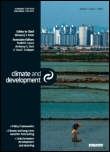
Climate and Development
Fostering Interdisciplinary Insights for Sustainable ProgressClimate and Development is a leading interdisciplinary journal dedicated to addressing the multifaceted challenges posed by climate change and its intersection with sustainable development. Published by Taylor & Francis Ltd, this esteemed journal, with an ISSN of 1756-5529 and E-ISSN 1756-5537, provides a platform for innovative research that informs policy and practice across the globe. With its remarkable impact factor and recognized standing in the Q1 categories for Development and Geography, Planning and Development, along with notable positions in Global and Planetary Change, the journal is ranked in the top percentiles of Scopus, solidifying its influence within key academic fields. Climate and Development seeks to publish high-quality research articles, reviews, and case studies that contribute to a nuanced understanding of the implications of climate phenomena on socio-economic frameworks. This journal is essential for researchers, professionals, and students aiming to enhance their understanding of climate issues and contribute to sustainable development initiatives, ultimately striving for resilience in vulnerable communities around the world.
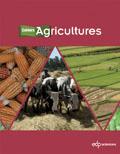
CAHIERS AGRICULTURES
Connecting researchers to shape agricultural practices.CAHIERS AGRICULTURES is a distinguished open-access journal published by EDP Sciences S A, focusing on the vital fields of Agronomy and Crop Science, Animal Science and Zoology, as well as Management, Monitoring, Policy, and Law. With an ISSN of 1166-7699 and an E-ISSN of 1777-5949, this journal has notably maintained a strong presence in the academic landscape since its establishment, covering a wide range of topics pertinent to agricultural sciences. Based in France, CAHIERS AGRICULTURES fosters collaboration and knowledge sharing among researchers and practitioners through its open-access model, which has been in effect since 2014. The journal is recognized for its rigorous peer-review process, reflected in its competitive Scopus rankings, which place it in the Q2 quartile for both Agronomy and Crop Science, and Animal Science and Zoology. Researchers and scholars are encouraged to contribute cutting-edge findings that may influence agricultural practices and policy development. With a vision to advance sustainable agricultural practices, CAHIERS AGRICULTURES stands as a critical resource for advancing scientific knowledge and informing stakeholders in the agricultural sector.

Agronomy-Basel
Nurturing the Future of Agronomy with Cutting-Edge ResearchAgronomy-Basel is a leading international journal dedicated to advancing the field of agronomy and crop science, published by the respected MDPI. Since its inception in 2011, this open-access journal has provided a vital platform for the dissemination of high-quality research, featuring innovative studies and reviews that contribute to the understanding of agricultural practices and crop management. With an impressive impact factor and ranked in the Q1 quartile of its category for 2023, Agronomy-Basel has established itself as a premier resource in the realm of Agricultural and Biological Sciences, achieving a commendable rank of #62 out of 406 in its field, placing it in the 84th percentile. The journal targets researchers, professionals, and students who are dedicated to enhancing agricultural sustainability and productivity. Located in Basel, Switzerland, the journal's commitment to open access empowers global accessibility to flourishing agricultural advancements, thus fostering collaboration and innovation across the globe.

Australian Journal of Emergency Management
Empowering communities with essential knowledge.The Australian Journal of Emergency Management, published by the Australian Emergency Management Institute, is a pivotal resource in the field of emergency management, public health, and safety research. With a history dating back to 1998 and a convergence period extending to 2024, this journal actively contributes to advancing knowledge and practice in emergency medical services and related areas. Holding strong positions in both the Q2 and Q3 quartiles of 2023 rankings, it stands out within its categories, particularly in Health Professions and Safety Research. While it is not an open-access journal, it provides essential insights and empirical research that are invaluable for researchers, professionals, and students alike. Located in East Melbourne, Australia, the journal ensures that critical advancements in emergency management and health are highly accessible to its global audience, fulfilling its mission to promote informed decision-making and improve community resilience during crises.
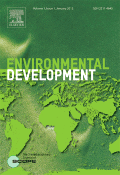
Environmental Development
Leading the charge in transformative environmental research.Environmental Development is a premier academic journal published by Elsevier, dedicated to advancing the field of environmental science through interdisciplinary research and innovative practices. With a focus on geography, planning, and development, as well as management, monitoring, policy, and law, this journal provides a rigorous platform for scholars and practitioners to share insights that shape sustainable environmental policy and practice. Holding a prestigious Q1 ranking in both relevant categories and boasting impressive Scopus rankings - 62 out of 821 in Geography and 60 out of 399 in Environmental Science - Environmental Development stands out as a critical resource for those invested in the future of our planet. The journal emphasizes impactful research that addresses contemporary challenges, fostering dialogue across disciplines and geographical boundaries. With a commitment to high-quality research, it offers an important outlet for those aiming to influence environmental policy and developmental strategies globally. Join the growing community of researchers, professionals, and students engaged in promoting sustainable environmental practices through the knowledge shared in this esteemed publication.

NJAS-Impact in Agricultural and Life Sciences
Pioneering research that cultivates sustainability and productivity.NJAS-Impact in Agricultural and Life Sciences is a pivotal open-access journal, published by Taylor & Francis Ltd, focusing on the interdisciplinary nexus between agricultural practices and life sciences. Anchored in the United Kingdom, this journal aims to provide a comprehensive platform for the dissemination of innovative research that addresses critical challenges in environmental sustainability, agricultural productivity, and biological advancements. With its inaugural issue dated from 2023 to 2024, NJAS prominently features the latest empirical studies, reviews, and theoretical contributions that enrich existing knowledge and provoke thought among researchers and practitioners alike. Although currently ranking within the lower percentiles across various Scopus categories, the journal aspires to establish itself as a significant contributor to the dialogue on agricultural and environmental sciences. As scholars in these fields seek to bridge the gaps in understanding, NJAS invites submission from diverse perspectives, underscoring the importance of collaborative knowledge-building in addressing the complexities of our changing global landscape.
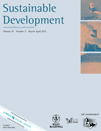
SUSTAINABLE DEVELOPMENT
Pioneering Insights in Development and Renewable EnergySUSTAINABLE DEVELOPMENT is a premier academic journal published by WILEY, dedicated to the dynamic fields of Development, Renewable Energy, and Sustainability. With a strong commitment to advancing knowledge, this journal holds an impressive impact factor that places it in the Q1 quartile in both the Development and Renewable Energy categories for 2023, underscoring its significant influence in the social sciences. Boasting a Scopus rank of 4th out of 306 in Development and 26th out of 270 in Renewable Energy, it reflects a high level of scholarly excellence and relevance, achieving percentiles of 98th and 90th, respectively. Established in 1993, and set to continue through 2024, the journal serves as a crucial platform for researchers, professionals, and students to share groundbreaking insights and foster interdisciplinary dialogue. Although not an open-access journal, it offers a wealth of essential research that addresses the pressing challenges of sustainable development, contributing to a more sustainable future.
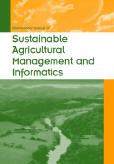
International Journal of Sustainable Agricultural Management and Informatics
Connecting knowledge and practice for a sustainable future.The International Journal of Sustainable Agricultural Management and Informatics, published by INDERSCIENCE ENTERPRISES LTD, stands at the forefront of advancing knowledge and practice in the fields of agricultural management and informatics. With a focus on sustainability, this journal addresses the urgent need for innovative strategies that harmonize agricultural productivity with ecological preservation. Since its inception in 2015, the journal has established itself as a crucial resource, with a notable presence in the 2023 Q3 quartile across several categories including Agricultural and Biological Sciences, Business Management, and Economics. The journal aims to disseminate high-quality research that appeals to a diverse audience, integrating informatics into sustainable practices in agriculture, thus fostering interdisciplinary dialogue and collaboration among researchers, practitioners, and policymakers. Although currently not an open-access journal, its publication ensures that vital research reaches the forefront of scientific and practical discourse, contributing to a sustainable future in agriculture.

Journal of Flood Risk Management
Shaping the future of flood risk management through collaboration.The Journal of Flood Risk Management, published by WILEY, is a premier academic journal dedicated to advancing the understanding and management of flood risks, emphasizing interdisciplinary approaches in environmental engineering, geography, safety, and water science. Since its inception in 2009 and transitioning to an Open Access model in 2020, this journal has quickly established itself within the top quartile (Q1) across multiple categories, including Environmental Engineering and Geography, Planning and Development, reflecting its high impact and relevance in the field. With an impressive ranking among the top journals—62nd in Geography, 28th in Water Science and Technology, and 25th in Safety, Risk, Reliability and Quality—this journal serves as an essential platform for researchers, professionals, and students alike, providing them with valuable insights and innovations related to flood risk management. Situated in Denmark, the journal aims to foster collaboration and knowledge exchange, addressing critical challenges faced by societies globally in mitigating and adapting to flood risks.
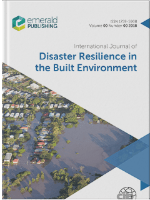
International Journal of Disaster Resilience in the Built Environment
Transforming risks into resilient solutions.International Journal of Disaster Resilience in the Built Environment is a leading peer-reviewed journal published by Emerald Group Publishing Ltd, focusing on the crucial intersection of disaster resilience and the built environment. Established in 2010, this journal serves as an essential platform for researchers, professionals, and students engaged in the fields of Building and Construction, as well as Safety, Risk, Reliability and Quality, maintaining a respectable Q3 ranking in both categories as of 2023. With a commitment to enhancing global knowledge on resilient construction practices, the journal examines innovative strategies to mitigate risk and enhance safety in built structures. Despite its robust academic reputation, it currently operates without an open access model, emphasizing its curated approach to high-quality scholarship. The publication aims to foster interdisciplinary collaboration and advance the development of sustainable practices within the context of disaster risk reduction, making it a vital resource for anyone dedicated to improving resilience in the built environment.